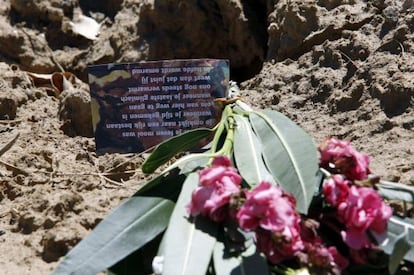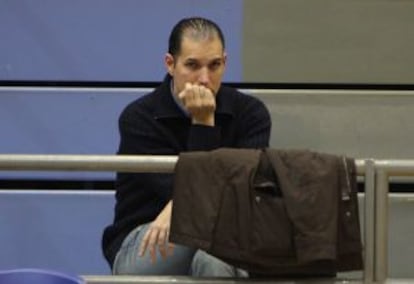A murder mystery in Murcia
Dutch volleyball star and her husband were killed last month in southern Spain Police believe that a business deal gone bad is the most likely motive

On May 13, retired Dutch volleyball star Ingrid Visser traveled to Murcia with her husband, Lodewijk Severein. Visser, aged 35 and pregnant, had spent the last two years of a career that saw her play for the Dutch national side 514 times in that Spanish city. Within hours of arriving she and Severein had been murdered. Their dismembered bodies, partially buried in a shallow grave in a lemon orchard, were discovered two weeks later.
Spanish police believe the killings are business related, and have arrested three men. So far, no official motive has been cited, but police point to the likelihood that the couple were killed over a failed business deal between Severein and a former executive at the CAV Murcia women's volleyball team.
Murcia's chief of police, Cyril Durán, has told reporters that there had been "certain business disagreements" between the murdered couple and the three men under arrest.
Ingrid Visser signed for CAV Murcia in 2005. After retiring from international volleyball, she played for a number of clubs outside the Netherlands, including Tenerife Marichal, helping the Canary Islands side to win the Champions League in 2004. CAV Murcia's offer was generous for a player in her thirties. The club had just been set up, and was backed by seemingly unlimited funding from its owner. He had business interests in the construction industry, which was booming in Murcia at that time.
Police say the killings are business related, and have arrested three men
CAV's owner is Evedasto Lifante, a self-made businessman who tried his luck with local soccer side Ciudad de Murcia. He failed to make his stamp on the team, and in search of greater glories, moved into women's volleyball, a sport where there is less competition and where, with financial backing, success can come relatively quickly.
Lifante first tried to buy CV Murcia, the side most associated with the city, but he failed. People involved in the negotiations say that it wasn't clear what Lifante wanted: he didn't want to be involved in the day-to-day running of the side, and instead seemed more interested in using it to launder money. So he bought another club. In those boom times - which are not that long ago - there was no shortage of men and women creating fortunes overnight, and with cash to spend.
In Murcia, where more than 60 percent of local councils were reportedly involved in corruption, there were plenty of opportunities for men like Lifante. He can be seen standing next to a Maserati in photographs from the time, and was known to hire planes for his personal use. He bought a luxury team bus, and would also splash out on dozens of lottery tickets, saying that he had always dreamed of winning the Christmas El Gordo draw. The highlight of his career was a brief interview on chat show host Andreu Buenafuente's late-night television program. Lifante used to boast that he had paid for that appearance.
His name regularly cropped up in the local newspaper, which celebrated his eccentricities. He was feted by the Popular Party-run city council. As he never tired of telling people, he had joined the PP at the age of 14. In short, he was seen as a benefactor; nobody asked any questions about how he had made his money.

He was the owner of a bar called Pétalos in the center of the city, known by all to be a brothel, and even advertised on local buses with a giant photo of a model bathed in rose petals. He claimed his money came from a marble quarry, which suggested that he was involved in construction, and would go some way to explaining his fortune. But, as far as EL PAÍS has been able to determine, he is not known in the marble business.
The marble quarry in question is located in the Sierra de Quibas, close to the tiny community of Barinas, where he was made mayor. The quarry has not been active for several years. Neither has the company he set up, Mármoles Sempere. It was an open secret in the local construction industry that the quarry was not the source of his wealth.
Lifante began looking for a frontman to run the volleyball club. The man he chose was Juan Cuenca, then aged 28, and who had some knowledge of volleyball. He ran a company called Universal Events, and was affiliated to the PP's youth wing, Nuevas Generaciones, in Valencia. Always immaculately turned out in suit and tie, with his hair slicked back, Cuenca tried to give the impression of being a successful businessman, but his past was littered with failures.
He had lost money in a business deal with the University of Valencia, as well as losing out in a volleyball tournament. Yet Lifante chose Cuenca to run his volleyball club, which he promised would come to dominate the Spanish and European game.
Evedasto Lifante was the owner of the CAV Murcia team, where Ingrid Visser played
It was Cuenca who signed Ingrid Visser. His approach to building a team was nothing if not practical: he would sign up veteran players approaching the end of their careers, but with a couple of good years left in them, and whose experience could be put to good use in a relatively weak league such as Spain's.
Cuenca handled negotiations with players like Visser. His opening gambit was to offer huge sums: Visser's salary was 300,000 euros a year. She was paid her first season's wages in advance. But the second year was different. Like everybody else on the team, she was not paid for months on end. Visser had several arguments with Cuenca about the issue, say her former teammates, one of which was in defense of a player who had not been paid for so long that she could not cover her rent any more.
Players such as Diana Sánchez and Anaebis Fernández, or coaches Pascual Saurín and Venancio Costa, say that they were not paid and are still owed money. Most people who worked with Cuenca regret the experience. "We knew that he was lying to us, but he always insisted that everything would be sorted out. He was one of those guys who can bring people round," says one former player at CAV Murcia. Others say that he was not averse to issuing threats. "He would insinuate that you needed to be careful about what you said, that Murcia was a small place. He was a compulsive liar," says a former coach. Cuenca was Lifante's right-hand man. He did the talking, and Lifante, escorted around in a limousine with bodyguards, put up the cash.
Lifante told EL PAÍS that he never used bodyguards, and accuses Cuenca of defrauding him. This explains why, when the police arrested Cuenca first, everybody looked for Lifante. The two had largely disappeared from public view after CAV Murcia folded in 2011. All that was left were a lot of people owed money, embargoes, final payment demands, and fines. The pair were most likely bankrupt.
Lifante chose Juan Cuenca as a frontman for the volleyball club
They would probably never have been heard of again had Ingrid Visse and her husband, a 57-year-old divorcee with two children, not traveled to Murcia and been killed. Visser had told family and friends that she was visiting Spain for a medical appointment, but had not told anybody that she was several weeks pregnant, preferring to wait. This was her second attempt at having a baby.
Severein had been a volleyball trainer, and was popular with the athletes he had worked with over the years. He was known to have money, but nobody knew anything about his business activities. A spokesman for the Visser family dismissed questions by reporters, saying it was "irrelevant." Reports in the Dutch media suggest Severein had sold a successful internet-related business.
He was a partner in a company called Guna Partners BV, and had reportedly set up a Gibraltar-based business with Cuenca.
Visser and Severein arrived in Murcia on May 13 for what was supposed to be a two-day trip. They hired a car in Alicante airport, and booked in to the Hotel Churra in Murcia, parking their car in the central Juan Carlos I Avenue. After that, little is known about their movements. On May 15, they failed to return to the Netherlands. A mutual friend of Cuenca and the couple drove them to a small hotel in a tiny village called Fenazar, close to the town of Molina del Segura, about 20 kilometers from the capital. The hotel, which has a swimming pool and a garden, has six rooms. Visser and Severein were due to meet with Cuenca. Also present were two Romanian bodyguards employed by Cuenca. The evidence suggests that the Dutch couple were beaten around the head repeatedly until they died.
Cuenca could bring people around... He was a compulsive liar"
Their corpses were then cut up into pieces and put in plastic bags, and then covered with caustic soda in an attempt to speed up decomposition. When the bodies were found, and the police began investigating, the woman who drove the couple to the hotel told the authorities she had been told to buy the caustic soda and a saw. She is now under a witness protection scheme.
Visser and Severein were then buried in a shallow grave in a lemon orchard in the village of Alquería, about 40 kilometers from the murder scene. It is not a particularly well-hidden place, being close to a crossroads and a restaurant, and is not easy to access. The police say that the choice of burial spot is significant. They believe that they have the perpetrators of the murders, but that others might be involved, and are looking at emails sent by the couple, as well as by Lifante and Cuenca.
During the two weeks it took to find the bodies, volunteers plastered the walls of the city with posters appealing for information about the missing couple.
At the same time, the search dominated the Dutch media. Visser was a popular player, who held the record for her number of appearances for the national side.
Lifante has told the police that Cuenca had the passwords to his email account and could have interfered with his correspondence. Lifante has also repeatedly accused Cuenca of cheating him, but has said nothing about the real motive for the killings. And finding a motive is, for the moment, the focus of police attention.
Tu suscripción se está usando en otro dispositivo
¿Quieres añadir otro usuario a tu suscripción?
Si continúas leyendo en este dispositivo, no se podrá leer en el otro.
FlechaTu suscripción se está usando en otro dispositivo y solo puedes acceder a EL PAÍS desde un dispositivo a la vez.
Si quieres compartir tu cuenta, cambia tu suscripción a la modalidad Premium, así podrás añadir otro usuario. Cada uno accederá con su propia cuenta de email, lo que os permitirá personalizar vuestra experiencia en EL PAÍS.
¿Tienes una suscripción de empresa? Accede aquí para contratar más cuentas.
En el caso de no saber quién está usando tu cuenta, te recomendamos cambiar tu contraseña aquí.
Si decides continuar compartiendo tu cuenta, este mensaje se mostrará en tu dispositivo y en el de la otra persona que está usando tu cuenta de forma indefinida, afectando a tu experiencia de lectura. Puedes consultar aquí los términos y condiciones de la suscripción digital.








































